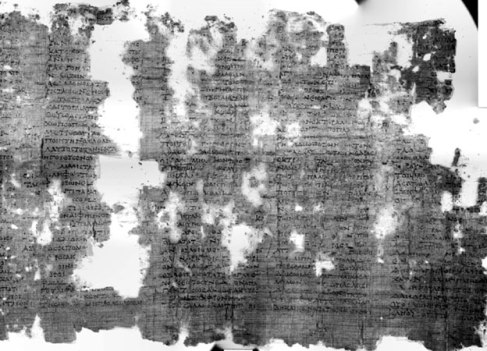Scientists have figured out a way to unroll and read the charred remains of scrolls from Herculaneum. Spoiler alert: it’s all the musings of a lesser known philosopher and one play about a loan shark and a pimp.
If you recall your ancient history, Herculaneum and Pompeii, two large, wealthy and flourishing cities near present day Naples were destroyed when Mount Vesuvius erupted in 79 AD. Some religious authorities may think this happened because the cosmopolitan inhabitants were really into sculptures of Pan having sex with a goat. But actually it was because volcanoes just erupt. This is how natural disasters happen.
The ruins of Pompeii and Herculaneum have taught us amazing things, primary of which is that while technology may change, people never do. Pompeii for example is full of graffiti, a lot of which translate roughly to “Cornelius was here, yo.”
Which brings us to the scrolls. They were found inside the library of the partially excavated summer villa of Julius Cesar’s father-in-law. So you know everyone assumed this had to be it. A guy that important. His library. This was the moment. So many of the greatest works of the ancient Greeks and Romans have not survived to this day except as mentions in other works. Now here was a chance to finally read them. Squee.
First there was the matter of figuring out how to do just that. The papyrus scrolls were turned into charred, black, unbelievably fragile sticks by the 752F temperatures, followed by layers of ash which then turned into solid rock. They were actually found in the 1700s and after some false starts a brilliant conservator from the Vatican figured out how to unroll the burnt remains using a machine he devised, which took 4 years to ever so carefully open the first scroll.
But even painstakingly unrolled, it was just a mess of little black fragments with the memory of text on it.
That is where modern science comes in.
Using infrared light created enough contrast between the ink and the paper to resurrect the almost 2,000 year old text.
What emerged is duplicate copies of the greatest and not so greatest hits of the philosopher and poet Philodemus of Gadara. Julius Cesare’s father-in-law it seems may have been his patron, and was letting him use the place as his working library. There was also that comedy in Latin about the loan shark and the pimp.
Scientists are trying to pressure the Italian government to allow them to excavate the rest of the villa to find what they believe are additional scrolls. The ones found were not just organized on shelves, but lying all about, on the floor and in carrying cases, so there is a good argument that more scrolls will be found lying around other parts of the villa. If people really never change, my bet is the most interesting ones are going to be near the bedside tables of the former occupants. Those will be the scrolls worth rereading.
Photo via BBC News
